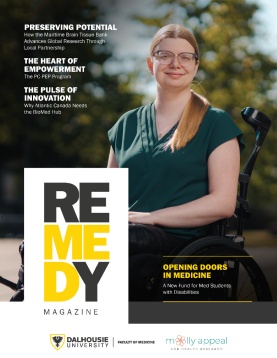News
Telling our research, education and patient care stories
News
Subscribe - ResearchResearch
» Full news listingNews Stories
–
Research
Friday, January 21, 2022
The majority of cancer cases arise from accumulated damage to our genetic material, a phenomenon that happens more than 10,000 times a day and can cause mutations to our DNA and lead to uncontrolled cell growth.
–
Research
Thursday, January 13, 2022
Adults over age 50 who experience mild or moderate COVID-19 are at greater risk of worsening mobility and physical function even if hospitalization is not required to treat the virus, according to new research out of Dalhousie and other Canadian universities.
–
Research
Thursday, December 16, 2021
There’s a new home for Black studies research at Dalhousie and OmiSoore Dryden wants everyone engaged in the field to feel welcome — regardless of their area of specialty.
–
Research
Tuesday, November 2, 2021
A group of scholars and researchers co-led by a Dalhousie professor has joined forces in an effort to re-shape medical and health education in Canada to better reflect the impacts of anti-Black racism on the delivery of care for African Nova Scotians and Black people.
–
Research
Monday, October 18, 2021
This October, as part of Women's History Month in Canada, learn more about Jeanette Boudreau, an assistant professor in the Department of Microbiology and Immunology and Department of Pathology in the Faculty of Medicine.
Associate professor in the Department of Community Health & Epidemiology at Dalhousie Medical School Dr. Bradley Johnston, recently found that certain multi-species probiotics reduce the odds of C. difficile infection by about two-thirds.
Dalhousie Medical Research Foundation is launching a new spring Molly Appeal to raise funds for a vital piece of equipment
Five researchers from Dalhousie are receiving new funding to acquire the cutting-edge tools needed to conduct world-class research through the Canada Foundation for Innovation's John R. Evans Leaders Fund.
A Dalhousie Medical School cancer immunologist has received a rare five-year operating grant.
A cross-Canada study led by Dalhousie Medical School researchers has proven that Aspirin is as effective as rivaroxaban in preventing blood clots after hip and knee replacement surgery — a finding which could mean substantial cost savings for patients.









_awards_Dal-led_project_$3.2_million_to_develop_new_immunotherapy_drugs_for_advanced_melanoma/_jcr_content/contentPar/newsArticle/image.adaptive.140.high.jpg/1526316660997.jpg)
